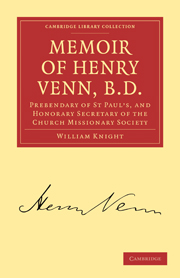 Memoir of Henry Venn, B. D.
Memoir of Henry Venn, B. D. Book contents
- Frontmatter
- PREFACE
- PREFACE TO THE FIRST EDITION
- Contents
- CHAPTER I EARLY YEARS AND LIFE AT CAMBRIDGE, 1796-1827
- CHAPTER II MINISTERIAL AND DOMESTIC. 1827-1839. DRYPOOL AND HIGHBURY
- CHAPTER III LETTERS. 1835-1846. DEATHS OF MISS A. SYKES AND MRS. VENN. RESIGNATION OF ST. JOHN'S, HOLLOWAY
- CHAPTER IV THE CHURCH MISSIONARY SOCIETY
- CHAPTER V PRIVATE JOURNAL, 1849-1856
- CHAPTER VI PERSONAL TRAITS
- CHAPTER VII LETTERS, 1846-1872
- CHAPTER VIII THE CLOSE
- APPENDIX
- A FOUNDERS OF C. M. SOCIETY, AND FIRST FIVE YEARS (1799—1804)
- B RETROSPECTIVE ADDRESS, MARCH 7, 1862
- C MINUTES ON THE ORGANISATION OF NATIVE CHURCHES
- D EPISCOPACY IN INDIA AND MADAGASCAR
- E POLITICS AND MISSIONS
- F MISSIONS IN THEIR VARIETY
- G SOME EMINENT MISSIONARIES
- H INDEPENDENT ACTION OF C. M. SOCIETY
- I THE PROPER INTERPRETATION OF THE BAPTISMAL SERVICE
- J COMMISSION ON CLERICAL SUBSCRIPTION
- K RITUAL COMMISSION
J - COMMISSION ON CLERICAL SUBSCRIPTION
Published online by Cambridge University Press: 05 October 2010
- Frontmatter
- PREFACE
- PREFACE TO THE FIRST EDITION
- Contents
- CHAPTER I EARLY YEARS AND LIFE AT CAMBRIDGE, 1796-1827
- CHAPTER II MINISTERIAL AND DOMESTIC. 1827-1839. DRYPOOL AND HIGHBURY
- CHAPTER III LETTERS. 1835-1846. DEATHS OF MISS A. SYKES AND MRS. VENN. RESIGNATION OF ST. JOHN'S, HOLLOWAY
- CHAPTER IV THE CHURCH MISSIONARY SOCIETY
- CHAPTER V PRIVATE JOURNAL, 1849-1856
- CHAPTER VI PERSONAL TRAITS
- CHAPTER VII LETTERS, 1846-1872
- CHAPTER VIII THE CLOSE
- APPENDIX
- A FOUNDERS OF C. M. SOCIETY, AND FIRST FIVE YEARS (1799—1804)
- B RETROSPECTIVE ADDRESS, MARCH 7, 1862
- C MINUTES ON THE ORGANISATION OF NATIVE CHURCHES
- D EPISCOPACY IN INDIA AND MADAGASCAR
- E POLITICS AND MISSIONS
- F MISSIONS IN THEIR VARIETY
- G SOME EMINENT MISSIONARIES
- H INDEPENDENT ACTION OF C. M. SOCIETY
- I THE PROPER INTERPRETATION OF THE BAPTISMAL SERVICE
- J COMMISSION ON CLERICAL SUBSCRIPTION
- K RITUAL COMMISSION
Summary
1. It should be laid down as a guiding principle in our discussions, that a definite standard of doctrine and an honest subscription to that standard form the safeguard of the liberties of the Church. The standard and the subscriptions taken together, form the fundamental compact between the five parties which compose a National Church—namely the Civil Authorities, the Bishops, the Patrons of Livings, the Incumbents, and the Congregations. This fundamental compact restrains within constitutional limits, the autocratical power of each party, and guarantees to each free action within those limits.
2. For instance, it is in virtue of this fundamental compact, that a patron, having no connection with a congregation, yet appoints its minister—who, once appointed, is fixed in a freehold for life, as the sole responsible minister of that congregation. Would the laity of a Church submit to such a system of patronage if the patrons were not restricted in their choice of incumbents to a class of men bound by honest subscription to a definite or approved standard of doctrine?
3. So also this fundamental compact secures the independence of the patrons, the parish ministers and the congregations against the arbitary power of ecclesiastical superiors. Do away with subscription, and a bishop would be at liberty to impose a private code of doctrine upon his diocese.
- Type
- Chapter
- Information
- Memoir of Henry Venn, B. D.Prebendary of St Paul's, and Honorary Secretary of the Church Missionary Society, pp. 491 - 497Publisher: Cambridge University PressPrint publication year: 2010First published in: 1880


